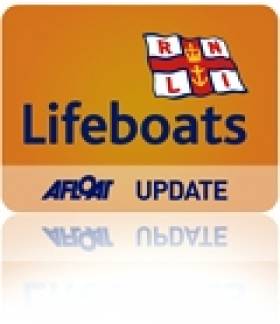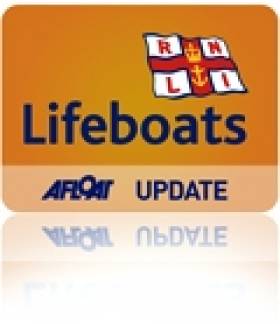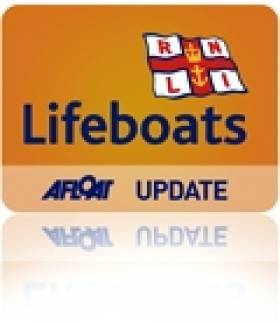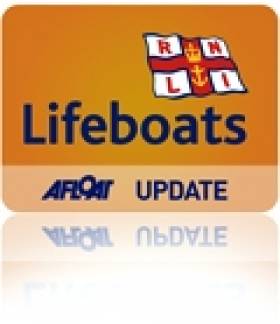Displaying items by tag: Portrush lifeboat
Distillery Raises Over £17,000 for Portrush Lifeboat
#rnli – Diageo Northern Ireland announced that it raised a total of £17,390 for its charity partner, the Royal National Lifeboat Institution (RNLI).
The staff at Bushmills Distillery participated in a number of fundraising events, ranging from the company's annual barrel roll to running the Belfast Marathon, all in aid of its chosen charity partner. The employees raised £8,965 which was then doubled by Diageo NI through a match-funding initiative.
The staff at the Distillery invited volunteer crew members from Portrush RNLI station to receive the cheque and to have a tour of the premises.
Gordon Donoghue, Bushmills Site Director said
'As part of an on-going commitment to investing in our communities, Bushmills employees and the local community have once again shown great generosity in raising such a huge sum for the RNLI. Diageo NI is proud to have carried out the substantial fundraising effort and we hope the funds raised will go some way towards saving lives at sea."
Robin Cardwell Lifeboat Operations Manager at Portrush said:
The crew were delighted to receive this cheque on behalf of the RNLI. We are overwhelmed at the generosity of Diageo NI and were very proud to be the nominated charity partner for the Distillery this year. The RNLI depends on these funds to train our volunteer crews and to maintain our equipment to the highest standards so we can continue to save lives at sea.
After the presentation the crew were given a tour of the premises and met staff who had participated in the fundraising events.
Portrush Lifeboat Goes on Snow Patrol
A snow laden Portrush All weather Lifeboat 'The William Gordon Burr' makes a fine photographic subject during an exercise off the North Coast.
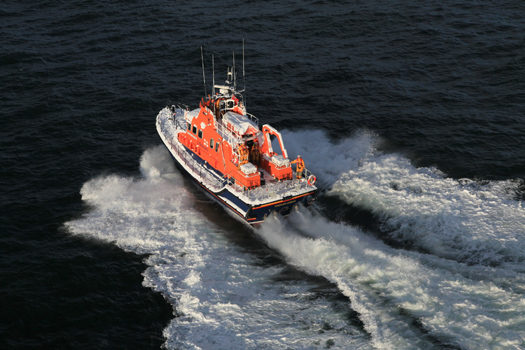
Related Safety posts
RNLI Lifeboats in Ireland
Safety News
Rescue News from RNLI Lifeboats in Ireland
Coast Guard News from Ireland
Water Safety News from Ireland
Marine Casualty Investigation Board News
Marine Warnings
Portrush Prepares to Celebrate 150 Years of Lifeboat Service
Portrush Lifeboat station celebrates its 150th anniversary next September 19th. The RNLI is holding a service and celebration at the Royal Court Hotel in Portrush.
Portrush is a popular tourist destination on Northern Ireland's famous Causeway Coast. The town sits on a peninsula jutting into the Atlantic between two sandy beaches.
The town Lifeboat owes its existence to Laura, Countess of Antrim, who, in 1860, successfully petitioned the RNLI to site one of the three new lifeboats on the "iron-bound coast" of north Ireland. Financed by Lady Cotton Sheppard of Staffordshire, the new lifeboat was initially named "Zelinda" and arrived in December of that year. It was later titled "Laura, Countess of Antrim" and saved 27 lives.
Related Safety posts
RNLI Lifeboats in Ireland
Safety News
Rescue News from RNLI Lifeboats in Ireland
Coast Guard News from Ireland
Water Safety News from Ireland
Marine Casualty Investigation Board News
Marine Warnings
Cold Swimmer Rescued in Portrush Harbour
After swimming across the harbour to the moored boat the teenager called for help. Belfast Coastguard co-ordinated the rescue and sent the Portrush ILB Lifeboat and the Coleraine Coastguard Rescue team to the scene.
The Portrush lifeboat took the teenager from the boat to the pontoon where he received first aid from the Coastguard Rescue team before being transferred to hospital by ambulance.
Belfast Coastguard Watch Manager Alan Pritchard said:
"It may be summer but the sea is chilly and the cold can seriously affect swimmers.
"If you are going to take a dip please know you're limits and remember cold water shock can be dangerous, even if you're young and fit and think you're able."
Related Safety posts
RNLI Lifeboats in Ireland
Safety News
Rescue News from RNLI Lifeboats in Ireland
Coast Guard News from Ireland
Water Safety News from Ireland
Marine Casualty Investigation Board News
Marine Warnings


























